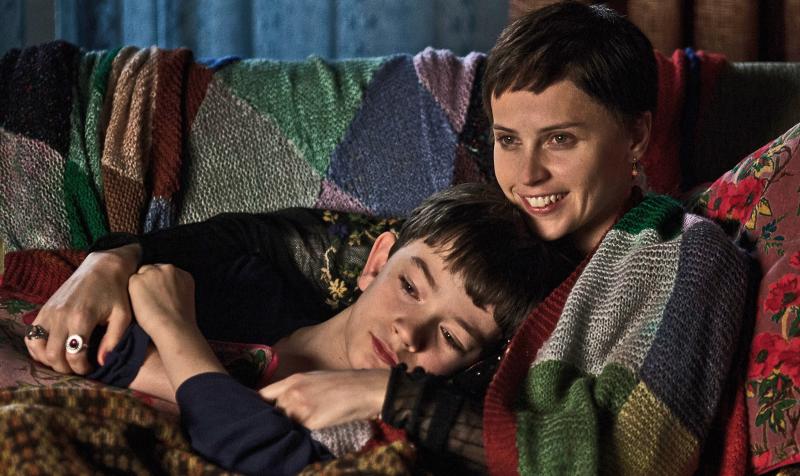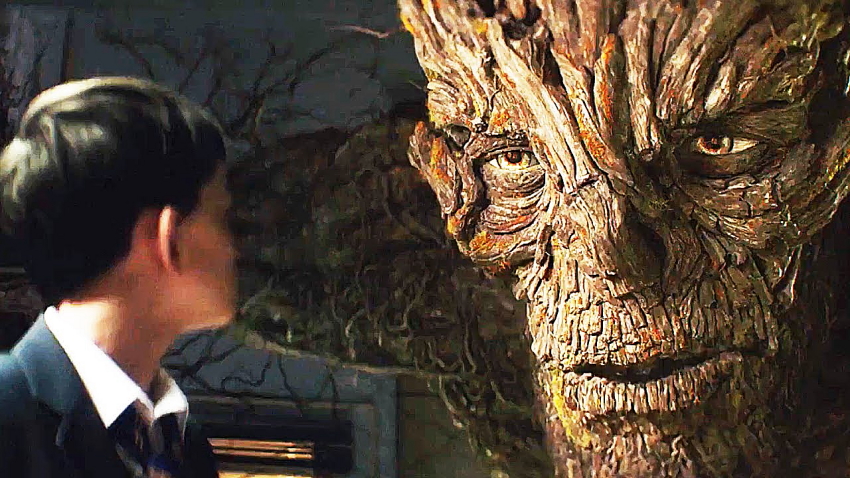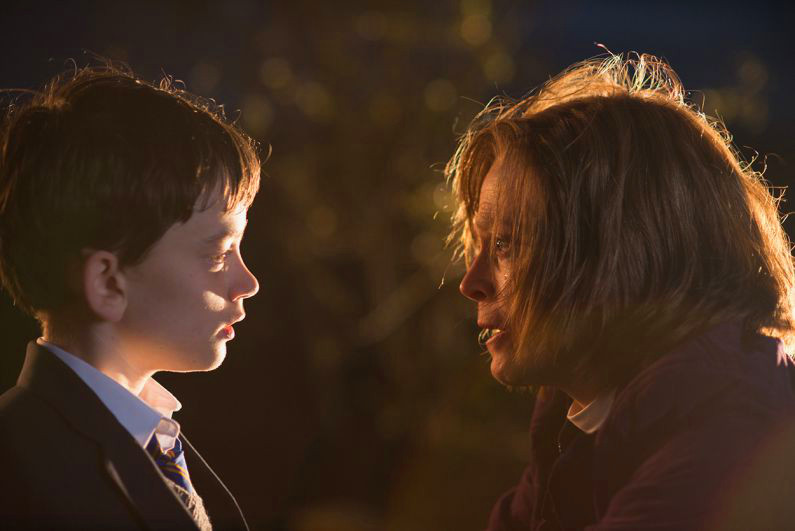A Monster Calls | reviews, news & interviews
A Monster Calls
A Monster Calls
Director JA Bayona's fantastical fairytale packs huge emotional wallop

It's not often you hear the sound of film critics sobbing quietly to themselves, but this really happened at the screening I attended of A Monster Calls. Having seen the trailer, with its scenes of a giant tree stomping around a spooky-looking rural landscape, I'd marked it down as one to avoid. How wrong can you be.
In conjunction with screenwriter Patrick Ness, who also wrote the original novel, director JA Bayona (known for the scary The Orphanage and the tsunami saga The Impossible) has conjured a bittersweet and often painfully moving account of bereavement and growing up, in which the grim burden of incurable illness is alleviated by the healing power, and instructional value, of art and fantasy. In the lead role of 12-year-old Conor O'Malley, trying to cope with being bullied at school while his mother Lizzie (Felicity Jones) fades away before his eyes, Lewis MacDougall is skilful enough to mix shrewdness and scepticism with the fear and confusion which threaten to drown him.
 Location shooting in Yorkshire and Lancashire has anchored the film in a grounded, ordinary-people environment, which makes the fantasy sequences leap off the screen even more startlingly (an opening scene of a church being nightmarishly sucked into an enormous hole in the ground will certainly pique your attention). Initially the talking yew tree feels like a bit of a stretch (and Liam Neeson's voice a little too much like Darth Vader), but as the monster's stern but ultimately benign purpose becomes clearer – and glimmers of humour creep into his stentorian pronouncements – the tale starts to exert a formidable imaginative grip.
Location shooting in Yorkshire and Lancashire has anchored the film in a grounded, ordinary-people environment, which makes the fantasy sequences leap off the screen even more startlingly (an opening scene of a church being nightmarishly sucked into an enormous hole in the ground will certainly pique your attention). Initially the talking yew tree feels like a bit of a stretch (and Liam Neeson's voice a little too much like Darth Vader), but as the monster's stern but ultimately benign purpose becomes clearer – and glimmers of humour creep into his stentorian pronouncements – the tale starts to exert a formidable imaginative grip.
The narrative's progression is tracked by the monster's sequence of three stories, depicted beguilingly with watercolour washes and animated characters. At first they just sound like fairytales ("You're going to tell me stories?" Conor scoffs incredulously), but eventually their true meanings reveal themselves. They're fables about self-belief and recognising that people tend to be neither good nor bad, like characters in fiction, but somewhere in between. Conor, having eventually been forced to confront his own "truth", finds, if not happiness, then at least a way to move forward.
 When not being swept along by the monster's roller-coaster parables – he has a habit of turning up at precisely 12.07am – Conor has to cope with hostile schoolmates, living with his grandmother who wants to feed him on steamed spinach (an excellent Sigourney Weaver, pictured left, reminding us that being advanced in years doesn't insulate you from shock and anguish), and dealing with his usually-absent father, who now lives in California. Dad is played with relaxed fecklessness by Tony Kebbell – "he's all start and no finish," as Weaver puts it – but a scene where he takes Conor on a day trip to a grey-skied Blackpool strikes a delicately-judged emotional note.
When not being swept along by the monster's roller-coaster parables – he has a habit of turning up at precisely 12.07am – Conor has to cope with hostile schoolmates, living with his grandmother who wants to feed him on steamed spinach (an excellent Sigourney Weaver, pictured left, reminding us that being advanced in years doesn't insulate you from shock and anguish), and dealing with his usually-absent father, who now lives in California. Dad is played with relaxed fecklessness by Tony Kebbell – "he's all start and no finish," as Weaver puts it – but a scene where he takes Conor on a day trip to a grey-skied Blackpool strikes a delicately-judged emotional note.
The depiction of Lizzie's worsening condition is never overplayed, though glimpsing her emaciated body is horrible enough, but it's through his own drawings and his mother's old sketch books that Conor begins to grasp something about life, death and the circle remaining unbroken. This film may even leave you feeling that you've learned something yourself.
The future of Arts Journalism
You can stop theartsdesk.com closing!
We urgently need financing to survive. Our fundraising drive has thus far raised £49,000 but we need to reach £100,000 or we will be forced to close. Please contribute here: https://gofund.me/c3f6033d
And if you can forward this information to anyone who might assist, we’d be grateful.

Subscribe to theartsdesk.com
Thank you for continuing to read our work on theartsdesk.com. For unlimited access to every article in its entirety, including our archive of more than 15,000 pieces, we're asking for £5 per month or £40 per year. We feel it's a very good deal, and hope you do too.
To take a subscription now simply click here.
And if you're looking for that extra gift for a friend or family member, why not treat them to a theartsdesk.com gift subscription?
more Film
 Spinal Tap II: The End Continues review - comedy rock band fails to revive past glories
Belated satirical sequel runs out of gas
Spinal Tap II: The End Continues review - comedy rock band fails to revive past glories
Belated satirical sequel runs out of gas
 Downton Abbey: The Grand Finale review - an attemptedly elegiac final chapter haunted by its past
Noel Coward is a welcome visitor to the insular world of the hit series
Downton Abbey: The Grand Finale review - an attemptedly elegiac final chapter haunted by its past
Noel Coward is a welcome visitor to the insular world of the hit series
 Islands review - sunshine noir serves an ace
Sam Riley is the holiday resort tennis pro in over his head
Islands review - sunshine noir serves an ace
Sam Riley is the holiday resort tennis pro in over his head
 theartsdesk Q&A: actor Sam Riley on playing a washed-up loner in the thriller 'Islands'
The actor discusses his love of self-destructive characters and the problem with fame
theartsdesk Q&A: actor Sam Riley on playing a washed-up loner in the thriller 'Islands'
The actor discusses his love of self-destructive characters and the problem with fame
 Honey Don’t! review - film noir in the bright sun
A Coen brother with a blood-simple gumshoe caper
Honey Don’t! review - film noir in the bright sun
A Coen brother with a blood-simple gumshoe caper
 The Courageous review - Ophélia Kolb excels as a single mother on the edge
Jasmin Gordon's directorial debut features strong performances but leaves too much unexplained
The Courageous review - Ophélia Kolb excels as a single mother on the edge
Jasmin Gordon's directorial debut features strong performances but leaves too much unexplained
 Blu-ray: The Graduate
Post #MeToo, can Mike Nichols' second feature still lay claim to Classic Film status?
Blu-ray: The Graduate
Post #MeToo, can Mike Nichols' second feature still lay claim to Classic Film status?
 Little Trouble Girls review - masterful debut breathes new life into a girl's sexual awakening
Urska Dukic's study of a confused Catholic teenager is exquisitely realised
Little Trouble Girls review - masterful debut breathes new life into a girl's sexual awakening
Urska Dukic's study of a confused Catholic teenager is exquisitely realised
 Young Mothers review - the Dardennes explore teenage motherhood in compelling drama
Life after birth: five young mothers in Liège struggle to provide for their babies
Young Mothers review - the Dardennes explore teenage motherhood in compelling drama
Life after birth: five young mothers in Liège struggle to provide for their babies
 Blu-ray: Finis Terrae
Bleak but compelling semi-documentary, filmed on location in Brittany
Blu-ray: Finis Terrae
Bleak but compelling semi-documentary, filmed on location in Brittany
 Oslo Stories Trilogy: Sex review - sexual identity slips, hurts and heals
A quietly visionary series concludes with two chimney sweeps' awkward sexual liberation
Oslo Stories Trilogy: Sex review - sexual identity slips, hurts and heals
A quietly visionary series concludes with two chimney sweeps' awkward sexual liberation
 Sorry, Baby review - the healing power of friendship in the aftermath of sexual assault
Eva Victor writes, directs and stars in their endearing debut feature
Sorry, Baby review - the healing power of friendship in the aftermath of sexual assault
Eva Victor writes, directs and stars in their endearing debut feature

Add comment